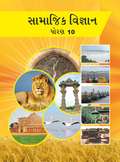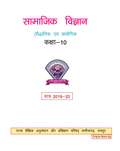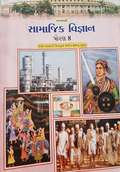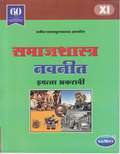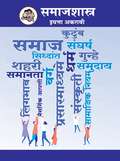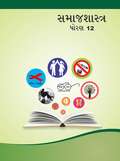- Table View
- List View
Samajik Vigyan class 10 - MP Board: समाज विज्ञान कक्षा 10 - एमपी बोर्ड
by madhya pradesh rajya shiksha kendra bhopalThis is the social-science 10th standard textbook from Madhya pradesh rajya shiksha kendra bhopal
Samajik Vigyan class 10 - S.C.E.R.T. Raipur - Chhattisgarh Board: सामाजिक विज्ञान कक्षा 10 - एस.सी.ई.आर.टी. रायपुर - छत्तीसगढ़ बोर्ड
by Raipur C. G. Rajya Shaikshik Anusandhan Aur Prashikshan Parishadसामाजिक विज्ञान पाठ्यपुस्तक कक्षा 10 वीं का राज्य शैक्षिक अनुसंधान और प्रशिक्षण परिषद् छत्तीसगढ़ रायपुर ने हिंदी भाषा में प्रकाशित किया गया है, इस पाठ्यपुस्तक में अध्ययन इतिहास, राजनीति विज्ञान, भूगोल और अर्थशास्त्र जैसी अलग-अलग इकाईयों के रूप में न होकर समग्र सामाजिक विज्ञान के रूप में प्रस्तुत किया जा रहा है। पाठ्यपुस्तक में राष्ट्रीय पाठ्यचर्या के चार शैक्षिक स्तंभों की प्रमुख अवधारणाओं को रेखांकित किया गया है जो विद्यार्थियों में रचनात्मक, ज्ञान एवं कौशल को बढ़ावा देते हैं। सामाजिक विज्ञान से हमें मानवीय मूल्यों और विश्व के प्रति सकारात्मक दृष्टिकोण और पूर्व में घटित घटनाओं को न दोहराते हुए उससे सीख लेने की शिक्षा मिलती है। देश की अर्थ व्यवस्था में हमारी भागीदारी सुनिश्चित करने का व्यापक दृष्टिकोण तथा सुशासन व्यवस्था की समझ विकसित करने का कार्य सामाजिक विज्ञान करता है। पाठ में प्रयोगात्मक और परिवेशीय आयामों को सम्मिलित किया गया है।
Samajik Vigyan class 6 - GSTB: સામાજિક વિજ્ઞાન વર્ગ 6 - જીએસટીબી
by Bimal Bhavsar Rangiya shree pankaj a. prajapati shree a.t.patel shree slim s. kureshi shree vasantray m. tereya shree v.m. baladaniya..... Navneet G Purnima Trivedi Bhavesh Pandya Akhil Gadhviઆ પુસ્તક ધોરણ ૬ નું સામાજિક વિજ્ઞાન નું પાઠ્યપુસ્તક છે .
Samajik Vigyan class 6 - RBSE: सामाजिक विज्ञान वर्ग 6 - आरबीएसई
by Rajasthan State Textbook BoardEducation book
Samajik Vigyan class 7 - GSTB: સામજિક વિજ્ઞાન ધોરણ૭ - જીએસટીબી
by Gstbપ્રસ્તુત પાઠ્યપુસ્તક ગુજરાત શૈક્ષણિક સંશોધન અને તાલીમ પરિષદ, ગાંધીનગર દ્વારા તૈયાર થયેલ અને રાજય સરકાર તરફથી મંજૂર કરવામાં આવેલ નવી અભ્યાસક્રમ અનુસાર તૈયાર કરવામાં આવેલ સામાજિક વિજ્ઞાન, ધોરણ વિષયનું અજમાયશી પાઠ્યપુસ્તક છે. જેમાં ૧૮ પાઠ આપેલ છે.
Samajik Vigyan class 8 - GSTB: સામાજિક વિજ્ઞાન ધોરણ 8 ગુજરાત બોર્ડ
by Gstbગુજરાત રાજ્ય શાળા પાઠ્યપુસ્તક મંડળ ધોરણ 8ના પાઠયપુસ્તકનું લેખનકાર્ય તથા સમીક્ષા નિષ્ણાત પ્રાધ્યાપકો અને શિક્ષકો પાસે કરાવવામાં આવ્યું છે અને સમીક્ષાકોનાં સૂચનો અનુસાર હસ્તપ્રતમાં યોગ્ય સુધારાવધારા કરવામાં આવ્યા છે. નવા અભ્યાસ ક્રમ મુજબ તૈયાર થયેલા આ પાઠયપુસ્તકના અધ્યાપનકાર્યમાં શિક્ષકોને સહાયરૂપ થાય તેવી સામગ્રીનો પણ આમાં સંક્ષેપમાં સમાવેશ કરવામાં આવ્યો છે. વાલીઓને પણ આ સામગ્રી ઉપયોગી થશે એવી આશા છે. વિદ્યાર્થી જે શીખે તે પાકું શીખે તેમજ તેઓ જે શીખ્યાં હોય તેનું દૃઢીકરણ થતું રહે તે માટે સ્વાધ્યાય-સામગ્રી પણ આ પાઠયપુસ્તકમાં આપવામાં આવી છે. આ કારણે વર્ગશિક્ષણ વિશેષ ફળદાયી. નીવડશે તેવી અપેક્ષા છે.
Samajik Vigyan class 8 - RBSE: सामाजिक विज्ञान कक्षा 8 - आरबीएसई
by Rajasthan State Textbook BoardSocial Science Textbook for Class 8
Samajik Vigyan class 9 - GSTB: સામાજિક વિજ્ઞાન વર્ગ 9 - જીએસટીબી
by Gstbઆ પુસ્તક ધોરણ નું ૯ સામાજીક વિજ્ઞાન વિષય નું પાઠ્યપુસ્તક છે .
Samajik Vigyan class 9 - MP Board: समाज विज्ञान कक्षा 9 - एमपी बोर्ड
by madhya pradesh rajya shiksha kendra bhopalThis is the social-science 9th standard book from Madhya pradesh rajya shiksha kendra bhopal in Hindi.
Samajik Vigyan Semester 2 class 8 - GSTB: સામાજિક વિજ્ઞાન દ્વિતીય સત્ર ધોરણ ૮ - જીએસટીબી
by Gstbઆ પાઠ્યપુસ્તકને અનુભવ, ચિંતન ઉપયોજન અને નિષ્કર્ષ તારવવાને લગતી પ્રવૃત્તિઓ દ્વારા શિક્ષણને અધ્યતાકેન્દ્રી બનાવવાનો પ્રયાસ કર્યો છે. વિદ્યાર્થીઓ વ્યક્તિગત અને સામુહિક રીતે જૂથમાં અધ્યયન કરે તે જરૂરી છે. એવી અધ્યયન પ્રક્રિયામાં મદદરૂપ થાય તેવાં પાઠયપુસ્તકો તૈયાર કરવાનો પ્રયત્ન કરવામાં આવ્યો છે. પાઠયપુરત્તક એ એક સહજ ઉપલબ્ધ અધ્યયન સામગ્રી છે.પાઠયપુસ્તક દ્વારા પ્રવૃત્તિલક્ષી શિક્ષણની બાબત નાવીન્યપૂર્ણ રીતે પ્રસ્તુત કરવામાં આવી છે.તે દ્વારા અધ્યયન-અધ્યાપન પ્રક્રિયા રોચક બનશે. પ્રસ્તુત પાઠ્યપુસ્તક પુસ્તક માં 1 થી 14 પાઠ છે અને સાથે પુનરાવર્તન 1 અને 2 છે.
Samajsastra class 12 - GSTB Guidebook: સમાજશાસ્ત્ર ધોરણ 12 - જીએસટીબી ગાઈડબુક
by Navneet Education Limitedધોરણ 12 સમાજશાસ્ત્ર વિષયની નવનીત છે.
Samajshastra (Apexit) class 12 - GSTB - Navneet: સમાજશાસ્ત્ર ધોરણ ૧૨ પ્રશ્નસંગ્રહો (માર્ચ, 2020ની બોર્ડ-પરીક્ષા માટે લેટેસ્ટ પેપર-પેટર્ન અનુસાર)
by Navneetધોરણ ૧૨ સમાજશાસ્ત્ર અપેક્ષિત માં વિભાગ A થી વિભાગ E સુધી માં ૨૧ પ્રશ્નસંગ્રહો આપેલ છે, અને ૨ આદર્શ પ્રશ્નપત્ર પણ આપેલ છે.
Samajshastra Digest class 11 - Maharashtra Board Guide: समाजशास्त्र डाइजेस्ट इयत्ता 11वी - महाराष्ट्र बोर्ड मार्गदर्शन
by Shri Navneetसमाजशास्त्र इयत्ता 11वी चे पुस्तक नवनीत एज्युकेशन लिमिटेडने मराठी भाषेमध्ये प्रकाशित केलेले आहे, या मार्गदर्शकाची (१) समाजशास्त्राची ओळख, समाजशास्त्रज्ञांचे योगदान आणि मूलभूत संकल्पना, (२) सामाजिक संस्था, (३) संस्कृती आणि सामाजीकरण, (४) सामाजिक स्तरीकरण आणि सामाजिक परिवर्तन या चार विभागांत विभागणी करण्यात आली आहे. या मार्गदर्शकातील प्रत्येक प्रकरणात सुरुवातीला महत्त्वाच्या मुद्द्यांचे स्पष्टीकरण देण्यात आले आहे. प्रस्तुत मार्गदर्शकात वस्तुनिष्ठ, लघूत्तरी व दीर्घोत्तरी अशा सर्व प्रकारच्या प्रश्नांचा समावेश केलेला असून, त्यांची सुबोध भाषेत मुद्देसूद, समर्पक व आदर्श उत्तरे देण्यात आली आहेत. अभ्यासक्रमात आणि पाठ्यपुस्तकात नव्याने समाविष्ट केलेल्या उपयोजनात्मक प्रश्न व त्या प्रश्नांची समर्पक उत्तरे यांचा प्रत्येक प्रकरणात समावेश करण्यात आला आहे.
Samajshastra Parichay class 11 - NCERT - 23: समाजशास्त्र परिचय ११वीं कक्षा - एनसीईआरटी - २३
by Rashtriy Shaikshik Anusandhan Aur Prashikshan Parishadसमाजशास्त्र परिचय 11वीं कक्षा का राष्ट्रीय शैक्षिक अनुसंधान और प्रशिक्षण परिषद् ने पुस्तक हिंदी भाषा में प्रकाशित किया गया है। यह पाठ्यपुस्तक समाजशास्त्र के परिचय हेतु एक आमंत्रण है। यह समाजशास्त्र विषय का विस्तृत एवं बोझिल वर्णन नहीं है, अपितु यह हमें इसका बोध कराती है और साथ ही समाज को समझने एवं अपनी जिंदगी को बेहतर समझने में समाजशास्त्र किस तरह हमारी मदद करता है, उसका ज्ञान प्रदान करती है। यह पाठ्यपुस्तक विद्यार्थियों को समाजशास्त्रीय दृष्टिकोण, उसकी संकल्पनाओं एवं अनुसंधान के साधनों से परिचित कराती है। यह पाठ्यपुस्तक दर्शाती है कि किस तरह समाजशास्त्र एक विषय की तरह इस तथ्य से संबंधित है कि हममें से प्रत्येक, समाज के सदस्य की तरह, समाज के बारे में सामान्य बौद्धिक विचार और समझ रखता है। समाजशास्त्र ज्ञान के एक निकाय के रुप में सामान्य बौद्धिक ज्ञान के निकाय से कैसे अलग है जोकि समाज में अवश्य पाया जाता है? क्या यह अपनी पद्धति और उपागम के कारण अलग है या यह इसलिए अलग है क्योंकि यह लगातार आलोचनात्मक प्रश्न पूछता है, क्योंकि यह किसी भी विचार को बिना विमर्श के स्वीकार नहीं करता? हम इस तरह के कई और प्रश्न जोड़ सकते हैं। समाजशास्त्र एक ऐसा विषय है जोकि हमें समाज, जिस तरह से कार्य करता है, वह क्यों और कैसे करता है, इसकी समझ देता है और इसके बारे में प्रश्न पूछने के लिए प्रशिक्षण देता है। इसीलिए समाजशास्त्र में प्रयुक्त शब्द एवं संकल्पनाएँ ज़रूरी हैं क्योंकि वही समाजशास्त्रीय समझ के हमारे साधन हैं।
Samajshastra Vishay Ani Drushtikon FYBA Second Semester- RTMNU: समाजशास्त्र: विषय आणि दृष्टिकोन बी.ए. प्रथम वर्ष द्वितीय सेमिस्टर - राष्ट्रसंत तुकडोजी महाराज नागपूर विद्यापीठ
by Dr Pradeep Aglaveराष्ट्रसंत तुकडोजी महाराज नागपूर विद्यापीठाने २०२०-२१ या शैक्षणिक सत्रापासून बी.ए. सत्र-१ आणि बी.ए. सत्र-२ च्या समाजशास्त्र विषयाच्या अभ्यासक्रमात काही बदल केला आहे. या नवीन अभ्यासक्रमानुसार प्रस्तुत पुस्तक लिहिले आहे. हे पुस्तक राष्ट्रसंत तुकडोजी महाराज नागपूर विद्यापीठाच्या बी.ए. सत्र-१ आणि बी.ए. सत्र-२ च्या अभ्यासक्रमानुसार लिहिले असले तरी महाराष्ट्रातील सर्वच विद्यापीठातील ‘समाजशास्त्र' किंवा 'समाजशास्त्र परिचय' या विषयाकरिता उपयुक्त आहे.
Samajshastra class 10 - Karnataka Board: ಸಮಾಜಶಾಸ್ತ್ರ ಹತ್ತನೇ ತರಗತಿ
by Karnataka Patyapustaka Sanghaಇದು ಸಮಾಜಶಾಸ್ತ್ರ ಹತ್ತನೇ ತರಗತಿಯ ಸಮಾಜಶಾಸ್ತ್ರ ಪಠ್ಯಕ್ರಮದ ಪುಸ್ತಕಗನ್ನು ಒಳಗೊಂಡಿದೆ.
Samajshastra class 11 - GSTB: સમાજશાસ્ત્ર વર્ગ 11 - જીએસટીબી
by Gstbઆ પુસ્તક ધોરણ 11 નું સમાજશાસ્ત્ર વિષય નું પાઠ્યપુસ્તક છે .
Samajshastra class 11 - Maharashtra Board: समाजशास्त्र इयत्ता अकरावी - महाराष्ट्र बोर्ड
by Maharashtra Rajya Pathyapustak Nirmiti Va Abhysakram Sanshodhan Mandal Puneसमाजशास्त्र इयत्ता अकरावी हे पुस्तक महाराष्ट्र राज्य पाठ्यपुस्तक निर्मिती व अभ्यासक्रम संशोधन मंडळ, पुणे यांनी लेखन केले आहे तसेच श्री. विवेक उत्तम गोसावी यांनी हे पुस्तक मराठी भाषेमध्ये प्रकाशित केले आहे. पाठ्यपुस्तकामध्ये समाजशास्त्राची ओळख, पाश्चिमात्य आणि भारतीय समाजशास्त्रज्ञांचे योगदान तसेच समाजशास्त्रातील मूलभूत संकल्पना, सामाजिक संस्था, संस्कृती, सामाजीकरण, सामाजिक स्तरीकरण आणि सामाजिक परिवर्तन इत्यादींचा ऊहापोह करण्यात आला आहे. प्रत्येक घटकांअंती, नमुन्यादाखल प्रश्न दिले आहेत आणि संकल्पना चित्रे, स्वअभिव्यक्तीचे प्रश्न, उताऱ्यावरील प्रश्न यांचा समावेश करण्यात आला आहे.
Samajshastracha Parichay Paper 1 FYBA First Semester - SPPU: समाजशास्त्राचा परिचय पेपर १ एफ.वाय.बी.ए. सेमिस्टर १ - सावित्रीबाई फुले पुणे यूनिवर्सिटी
by Dr Jyoti Gagangras Prof. Dr. Sudhir Yevaleसमाजशास्त्र अभ्यास मंडळाने प्रथम वर्षाच्या विद्यार्थ्यांसाठी या अभ्यासक्रमाची निवड करताना खूप कष्ट व काळजी घेतलेली दिसते. मागील अभ्यासक्रमातील कालबाह्य बाबी काढून टाकून समकालीन सामाजिक बदलांचा विचार करूनच या अभ्यासक्रमाची रचना करण्यात आली आहे. सेठ/नेटसारख्या परीक्षा, स्पर्धा परीक्षा व इतर समाजशास्त्र विषय निवडून ज्या काही व्यावसायिक संधी विद्यार्थ्यांना आहेत त्यासाठी त्यांचा प्रवास सुकर व्हावा हाही या अभ्यासक्रमामागील उद्देश आहे. समाजशास्त्रातील वाढत्या संधी, संशोधन, आर्थिक, शिक्षण, कायदा, पत्रकारिता, औद्योगिक, राजकीय, सामाजिक यांतील समकालीन मुद्द्यांना या अभ्यासक्रमात समाविष्ट केले आहे. कुटुंब, नातेसंबंध याचे बदलते स्वरूप अधोरेखित करण्याचा प्रयत्नही झाला आहे. शिक्षक व विद्यार्थी यांना आकलन होईल अशा सोप्या व सरळ भाषेत हा अभ्यासक्रम मांडण्याचा प्रयत्न केला आहे. वापरले जाणारे पर्यायी शब्दही दिले आहेत.
Samajshastracha Parichaya FY. BA. Pune University
by DR Sudhir Yevle. Jyoti S. GagangrasSamajshastracha Parichaya Marathi text book for First year from The Pune Universtity in Marathi.
Samajshastrachi Multatve First Semester FYBA New NEP Syllabus - RTMNU: समाजशास्त्राची मूलतत्वे पहिले सत्र एफ.वाय.बी.ए. नवीन एन.इ.पी. अभ्यासक्रम - राष्ट्रसंत तुकडोजी महाराज नागपूर विद्यापीठ
by Dr Pradeep Agalave Dr Rahul Bhagat"समाजशास्त्राची मूलतत्त्वे" हे पुस्तक समाजशास्त्राच्या विविध पैलूंचे विश्लेषण करते. यात समाजशास्त्राचा उदय, विकास आणि एक विद्याशाखा म्हणून असलेले महत्त्व यावर प्रकाश टाकण्यात आला आहे. लेखकांनी युरोपातील आधुनिकीकरण आणि सामाजिक बदलांच्या संदर्भात समाजशास्त्राच्या विकासाचे स्पष्टीकरण दिले आहे. पुस्तकात, समाजशास्त्र एक विज्ञान म्हणून कसे विकसित झाले, याची माहिती दिली आहे. विज्ञानाची व्याख्या, वैज्ञानिक पद्धती आणि समाजशास्त्रातील तथ्यांचे महत्त्व यावर चर्चा केली आहे. तसेच, सामाजिक स्तरीकरण आणि गतिशीलतेच्या संकल्पनांचे विश्लेषण आहे. समानता, असमानता, विषमता, सामाजिक वर्ग आणि गतिशीलता यांसारख्या घटकांचा अभ्यास यात आहे. आधुनिक समाजातील सामाजिक बदल आणि त्यावर परिणाम करणारे घटक जसे की शिक्षण, विज्ञान आणि तंत्रज्ञान यांचा विस्तृत आढावा लेखकদ্বারা घेतला आहे. हे पुस्तक समाजशास्त्र विषयातील विद्यार्थ्यांना उपयुक्त आहे.
Samajshastrachi Olakh FYBA First Semester - SPPU: समाजशास्त्राची ओळख एफ.वाय.बी.ए. सेमिस्टर १ - सावित्रीबाई फुले पुणे यूनिवर्सिटी
by Dr Vijay M. Jadhavसावित्रीबाई फुले पुणे विद्यापीठाच्या एफ.वाय.बी.ए. या शैक्षणिक वर्षासाठीच्या अभ्यासक्रमात या वर्षापासून सुधारणा करण्यात आली आहे. समाजशास्त्र (समाजशास्त्राची ओळख) या पेपरच्या अभ्यासक्रमात सुचविण्यात आलेल्या सुधारणांची जून २०१९ पासून अंमलबजावणी होत आहे. समाजशास्त्राची ओळख या पुस्तकाच्या सुरूवातीला समाजशास्त्र या विषयाची मूलभूत माहिती, समाजशास्त्रांतर्गत येणारे अभ्यासविषय त्याचप्रमाणे समाजशास्त्राचा उदय, समाजशास्त्रातील विविध क्षेत्रे, समाजशास्त्रातील रोजगारविषयक संधी याबाबत स्पष्टीकरण देण्यात आले आहे. दुसऱ्या प्रकरणात समाज त्याचा अर्थ, व्याख्या, समाजाची वैशिष्ट्ये, समाजाचे स्थल-कालानुसार बदलत गेलेले प्रकार, त्याचप्रमाणे समूह, समूहाची संकल्पना, सामाजिक समूहाची वैशिष्ट्ये, समूहाचे महत्त्व याबाबत माहिती देण्यात आली आहे. तसेच समुदाय आणि सोशल नेटवर्किंग या संकल्पनांची देखील चर्चा प्रस्तुत प्रकरणात केली आहे. पुस्तकाच्या तिसऱ्या प्रकरणात संस्कृती, संस्कृतीचे प्रकार यांची देखील सविस्तर चर्चा करण्यात आलेली आहे. तसेच सामाजिक स्तरीकरण, स्तरीकरणाची वैशिष्ट्ये, स्तरीकरणाचे आधार, सामाजिक अपवर्जन, सामाजिक असमानता यांची देखील विस्तृत आणि तपशीलवार चर्चा प्रस्तुत प्रकरणात करण्यात आली आहे.
Samajshastrachi Olakh First Semester FYBA New NEP Syllabus - SPPU: समाजशास्त्राची ओळख प्रथम सत्र एफ.वाय.बी.ए. नवीन एन.इ.पी. अभ्यासक्रम - सावित्रीबाई फुले पुणे यूनिवर्सिटी
by Dr Jyoti Suhas Gagangrasसावित्रीबाई फुले पुणे विद्यापीठाच्या (SPPU) नवीन राष्ट्रीय शैक्षणिक धोरण (NEP) 2020 अंतर्गत प्रथम वर्ष बी.ए. (FYBA) अभ्यासक्रमात समाजशास्त्राची ओळख हा अभ्यासक्रम समाविष्ट केला आहे. समाजशास्त्र हे मानवी जीवनाच्या विविध पैलूंवर आधारित शास्त्र असून, ते समाज, त्यातील सहजीवन, परस्परसंबंध, वर्तन, आणि सामाजिक प्रक्रियांवर सखोल अभ्यास करते. प्राचीन काळापासून मानवाने सामाजिक जीवनाचा विचार केला असला तरी आधुनिक समाजशास्त्राचा उगम १९व्या शतकात झाला. याचे जनक ऑगस्त कॉम्प्त यांनी समाजाचा अभ्यास शास्त्रीय पद्धतीने करण्याचा पाया घातला. समाजशास्त्र मानवी सहजीवनातील विविध समस्या, सामाजिक संघटनांचा उगम, विकास, आणि त्यामधील विविधतेचे विश्लेषण करते. यामध्ये विविध समाजांची तुलनात्मक पाहणी केली जाते. समाजशास्त्राचा अभ्यास केवळ समाजाच्या स्वरूपावरच नव्हे तर सामाजिक समस्या, आर्थिक विषमता, सांस्कृतिक बदल, आणि तंत्रज्ञानामुळे होणाऱ्या परिणामांवरही केंद्रित असतो. यामुळे समाजाच्या प्रगतीत, नियोजनात आणि धोरणनिर्मितीत समाजशास्त्र महत्त्वाची भूमिका बजावते. सामाजिक नियंत्रण, सामाजिकीकरण, व समाजातील मूल्य-नियमांचे पालन आणि सामाजिक एकात्मतेसाठी आवश्यक तत्त्व यांचाही अभ्यास समाजशास्त्राच्या अंगाने केला जातो. आधुनिक जगात बदलत्या जीवनशैलीमुळे समाजशास्त्र हे शास्त्र समाजाच्या गरजांना अनुरूप राहून नवीन दृष्टिकोन विकसित करत आहे. अशा प्रकारे, समाजशास्त्र हे फक्त शास्त्रीय ज्ञानाचाच विषय नाही तर मानवी समाजाच्या सर्वांगीण विकासासाठी अपरिहार्य ठरते.
